【Interview】Part 1: Unveiling the Journey of Dr. Jiro Aikawa: Launching SHEP Approach in Kenya
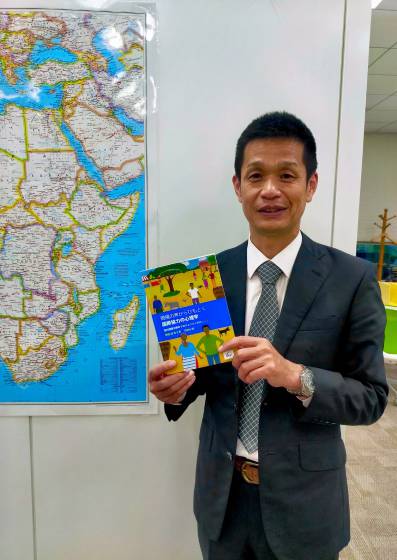
Dr. Jiro Aikawa has been actively involved in numerous agricultural projects across African countries for decades, ever since his service as a Japan Overseas Cooperation Volunteers (JOCV) in Tanzania in 1992, where he provided guidance on fruit tree cultivation. In 2010, Dr. Aikawa took on a pivotal role as the Senior Advisor for Agriculture and Rural Development at the Japan International Cooperation Agency (JICA). In this capacity, he was a guiding force for JICA's agricultural projects, traveling extensively between Japan and various countries including Africa. Since 2022, he has further amplified his contributions by joining the Board of Councillors for Sasakawa Africa Association.
Dr. Aikawa's dedication to international cooperation in agriculture was spotlighted in 2013 during the 5th Tokyo International Conference on African Development (TICAD V) held in Yokohama. At this event, Prime Minister Shinzo Abe gave a spotlight to the SHEP (Smallholder Horticulture Empowerment & Promotion) Approach as a testament to Japan's technical cooperation successes. Prime Minister Abe proudly introduced Dr. Aikawa, by then popularly known as "Mr. SHEP", citing him as a symbol of the many Japanese individuals passionate about their roles in Africa.
In our interview, Dr. Aikawa delves into the core principles of SHEP, elaborating on its implementation and growth across multiple African nations. He also provides a glimpse into his association with SAA and articulates his vision for the future of the organization.
|
Jiro Aikawa (Senior Advisor for Agriculture and Rural Development of Japan International Cooperation Agency (JICA)
Dr. Jiro Aikawa, PhD in Agriculture, boasts over two decades of experience in agricultural extension and capacity building, primarily in Africa and various other developing nations. In 2006, he worked on a JICA agricultural project in Kenya where his team developed the SHEP approach. Since 2010, he's been a Senior Advisor for Agriculture and Rural Development of JICA, supporting various agriculture projects worldwide. Since 2022, he has been on the Board of Councillors for Sasakawa Africa Association. |
Demystifying SHEP: Exploring its core principles and objectives with Dr. Aikawa
SAA: SHEP stands out as an approach that transitions farmers from the traditional "Grow and sell" mindset to a more proactive "Grow to sell", instilling market-oriented farming skills. Could you shed light on the fundamental concept of SHEP?
Aikawa: Certainly. Let's visualize SHEP through the diagram provided. The yellow circle captures the idea of bridging the information gap between farmers and the market, mitigating market information asymmetry. On the other hand, the red circle embodies the fulfillment of psychological needs based on self-determination theory, which entails bolstering autonomy, competence, and relatedness. Now, where these two circles intersect, represented by the orange shade, lies the distinct heart of the SHEP approach. When we rolled out these methods across various African countries from 2014 onwards, we underscored that implementing activities within this orange overlap is essential for SHEP's success, irrespective of the country’s context.
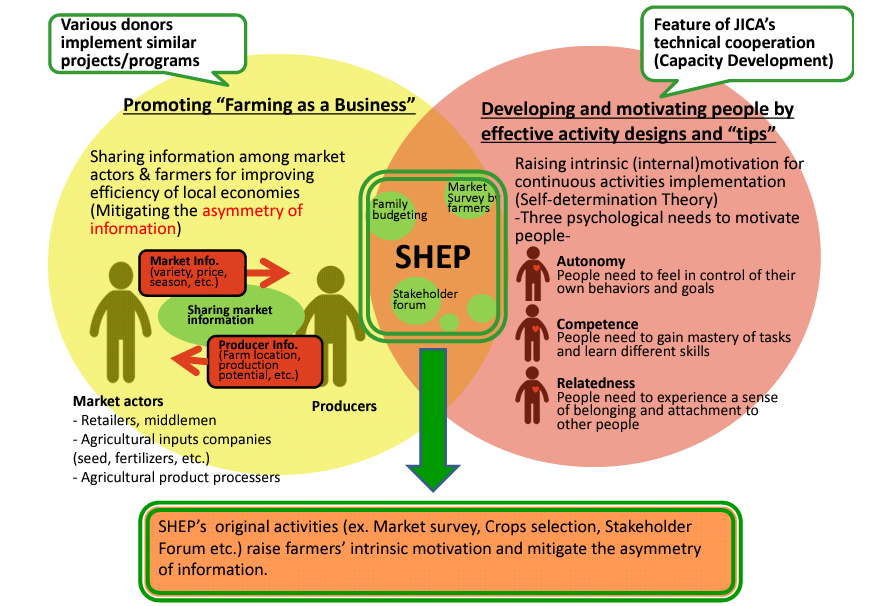 Figer1:SHEP Approach Essence
Figer1:SHEP Approach EssenceReference: Japan International Cooperation Agency (JICA) website: https://www.jica.go.jp/Resource/english/our_work/thematic_issues/agricultural/shep/concepts.html
Aikawa: In this regard, there are four steps to follow:
1. Empowering farmers to crystallize their vision and objectives.
2. Encouraging farmers to foster self-awareness.
3. Enabling farmers to autonomously make critical decisions, from crop selection to the timing of planting.
4. Offering technical support to farmers based on the decisions they have made.
We have consistently conveyed the importance of this process through training.
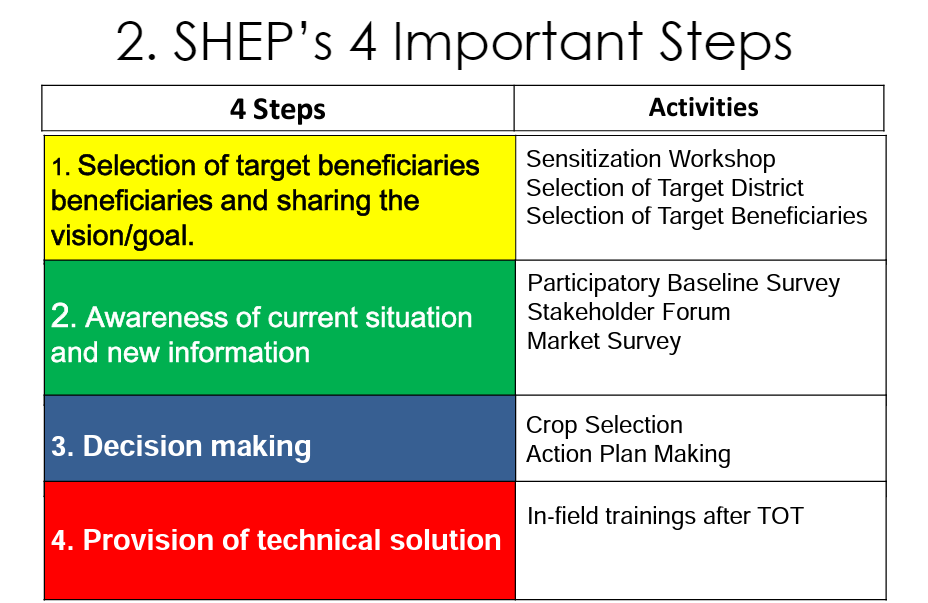 Figer2:SHEP’s 4 Important Steps
Figer2:SHEP’s 4 Important StepsReference: Japan International Cooperation Agency (JICA) website: https://www.jica.go.jp/Resource/english/our_work/thematic_issues/agricultural/shep/4steps.html
Smallholder Horticulture Empowerment Project initiated in Kenya
SAA: We understand that SHEP's first endeavor was a technical cooperation project between the Kenyan government and JICA, focusing on smallholder farmers. Could you recount how you became a part of this transformative venture?
Aikawa: In 2006, the project to enhance income for smallholder farmers through horticulture began in Kenya, and I was approached by JICA to serve as the Chief Advisor.
We were faced with the challenge of how to increase farmers' income through horticulture (vegetable cultivation). The equation wasn't merely "boost yield equals higher income." If every farmer harvested the same crop simultaneously, the market price for that crop could plummet. Initially, the project had plans to choose the crops for the farmers, but we were unsure if we could select the right crops. It was a significant responsibility.
To navigate this, we pondered letting local governmental entities in our project's jurisdiction – spanning four districts – to pinpoint crops congruent with their region's climatic and environmental nuances. Yet, a hitch remained: they might not be accountable if their chosen crops fetched low market prices. Therefore, we decided to let the farmers themselves decide, with the aim of helping them understand market needs. We then started by training farmers to conduct market surveys, enabling them to carry out market research independently.
SAA: This aligns with one of the SHEP approach's principles, which is to "Bridge the information gap between farmers and market stakeholders" (represented by the yellow circle). Then, how did the other aspect, "Rising intrinsic motivation for continuous activities implementation" (represented by the red circle), get established?
Aikawa: Before my assignment in Kenya, I had the opportunity to learn about the importance of Self-determination Theory during an agricultural outreach initiative in Kilimanjaro. Here, we conducted training in agricultural techniques for core farmers in the region, and these core farmers would then disseminate the knowledge to other farmers in their communities. The core farmers were not receiving monetary rewards but found joy in mentoring others. The system worked exceptionally well.
This led us to the Self-determination Theory's "Overjustification Effect," a notion proposing that layering external rewards onto intrinsically motivated activities can actually diminish one's zeal for the task. This was a eureka moment: the joy and commitment exuded by these mentor-farmers could be mapped onto psychological constructs. Hence, in the SHEP framework, we stress immensely on nurturing farmers' intrinsic drive.
SAA: Such Self-decision making would increase their autonomy and motivation. How was the initial market survey unfolded in Kenya?
Aikawa: Empowering farmers to make crop choices necessitated hands-on market surveys. Given that a majority of farmers were unacquainted with urban markets, let alone research methodologies, we scaffolded the process. We prepared a simple questionnaire and arranged for farmers to directly interview produce sellers about prices, timing, quality, and customer preferences. This hands-on expedition, where farmers unraveled previously unknown market dynamics, was instrumental. The pilot across the four Kenyan districts marked a triumphant commencement.
▸[Part 3] Unveiling the Journey of Dr. Jiro Aikawa: Sharing insights with SAA projects
SAA Publications
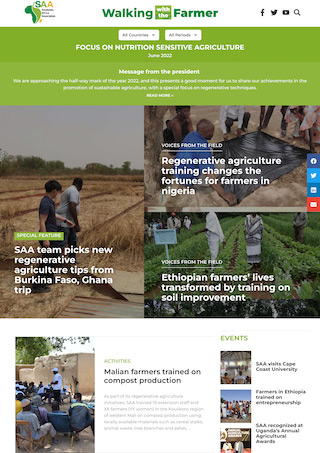
E-newsletter
"Walking with the Farmer"
SAA publishes a bimonthly e-newsletter reporting on SAA activities.
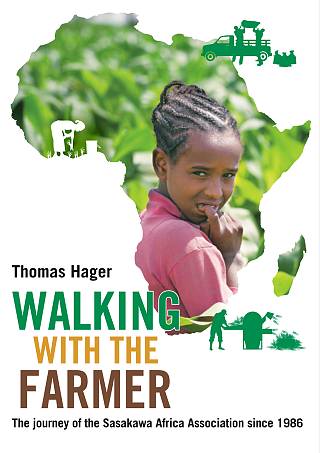
SAA history book
"Walking with the Farmer: The journey of the Sasakawa Africa Assoication since 1986"
This book chronicles the history of SAA from its inception to the present.
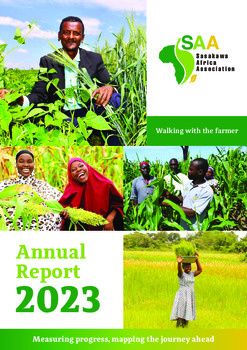
Annual Report
Annual Report FY2023
Annual Report FY2023 is available here.




